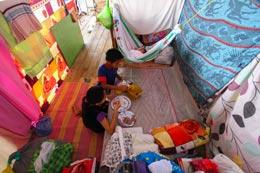Manila promises more accountability for relief aid

Canada is pumping another $20 million to help the survivors of a devastating typhoon that swept the Philippines as accusations fly in the Southeast Asian nation of political divisions, bureaucracy and corruption bogging down rehabilitation efforts.
Typhoon Haiyan aka Yolanda slammed into the Philippines on 8 November last year, bringing devastating winds that at their peak hit 300km an hour. It left thousands dead and displaced nearly one million people, according to government data. It swept across the Philippines’ central islands from the Pacific, cutting a swathe of destruction in 171 (out of the country’s nearly 1,500) municipalities and making four landfalls.
The hardest hit areas were in and near Tacloban in Leyte Province, a coastal city of 250,000 people before the disaster hit. About 90 percent of the province was damaged, when huge waves swallowed up villages, while strong winds blew away homes.
One year later, the government and UN statistics say at least 25,000 people still live in tents and bunk houses. Observers say that while the emergency response was quick, bureaucracy and politicking has slowed reconstruction and rehabilitation.
“We only have about 100 of the promised 14,500 permanent homes finished. The government can only work with the resources it has, and you have to understand this is a massive rehabilitation and recovery effort,” Tacloban mayor Alfred Romualdez told IRIN.
Audit reports show startling revelations that millions had been wasted in food food packs due to improper storage or handling; authoritis had had failed to distribute nearly $15 million in cash assistance to victims; and either stored in government bank accounts, or spent on government operations, tens of millions of dollars originally intended for relief and rehabilitation efforts.
Amidst these allegations, Canada this week launched a rehabilitation plan amounting to some $20 million for communities affected by super typhoon Haiyan that devastated the Visayas region in November last year.
The Typhoon Haiyan Reconstruction Assistance Call for Proposals in Ottawa, which will be implemented over a period of four years “is designed to help restore the livelihoods of people in the Philippines affected by typhoon Yolanda,” or known internationally as Haiyan.
It forms part of the Typhoon Haiyan Relief Fund through which the government of Canada matched the $85 million in eligible donations made by individual Canadians to registered Canadian charities in the aftermath of the killer storm.
“On this one-year anniversary of Typhoon Yolanda, we pay tribute to the resilience of the people in the Philippines affected by the storm, the work of our partners and the generosity of Canadians,’’ said Canada's ambassador to the Philippines Neil Reeder.
“Our relationship with the Philippines and the Filipino-Canadian community is long-standing and strong, and we will continue our support to help build a better future for the people of this country," he added.
Canada was among the several countries that responded to global calls for aid to the Philippines after the storm struck, providing significant humanitarian assistance to meet the immediate and early recovery needs of affected people.
It has also deployed a number of experts from various Canadian government agencies to support a broad range of critical needs faced by the Filipino authorities.
The call for proposals is open to Canadian organizations that are legally incorporated in Canada with at least five years of experience managing and delivering post-disaster livelihood programming, the embassy said.
Projects funded under this call for proposals must align with the ultimate outcome of improving the economic well-being of women, men, girls and boys affected by Yolanda, the embassy said.
Each selected project would have an estimated contribution of between Cad$3 million and Cad$7 million.
Meanwhile, Manila responding to allegations of relief aid abuse said it is ensuring accountability and transparency in the implementation of projects for the rehabilitation of 171 cities and municipalities damaged by super typhoon Yolanda.
In a press conference in Bogo City, Sec. Panfilo Lacson, presidential assistant for rehabilitation and recovery, said President Benigno Aquino III is serious in implementing the Electronic Management Platform Accountability and Transparency Hub for Yolanda (Empathy).
In Empathy, Lacson said the details of all the 18,000 programs, activities and
projects are uploaded including the location of the project, winning bidder, date awarded to the contractor, cost of the project, date the project started, date of target completion and project status.
Lacson said the media, government agencies, government’s bilateral partners like JICA and World Bank, private sector and donors, about 50 of them, are given access to Empathy so they can monitor how the projects are implemented and uploaded their comments, if there is any.
“If a person will report to Empathy that a project is seemingly substandard, we will immediately send a team to inspect it,” Lacson said.
He said the government would also know through Empathy the contractors who are lagging behind in project implementation.






